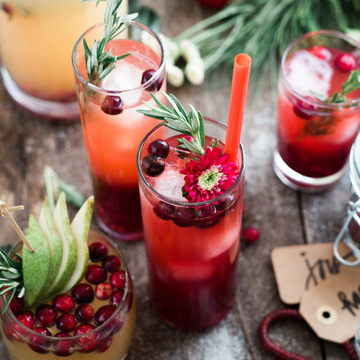Smart Drinking Tips
There’s no doubt about it, it can be tricky for some people to keep an active social life while being conscientious of what they are drinking when on a diet or program, especially during the Christmas period. But, please know, indulging in alcohol every now and then is not a bad thing! With the right tricks up your sleeve, you can make it work.
What are the Benchmarks?
According to the NHMRC alcohol guidelines, it is recommended that healthy adults should drink no more than 10 standard drinks a week[4], which is any drink that contains 10g of alcohol. Evidence has shown that excessive alcohol consumption can contribute to excessive weight gain[1,2], which also increases the risk of cardiovascular diseases, diabetes and cancer[3].
Examples of a Standard Drink[5] include:
- Light beer, 425 mL
- Mid strength beer, 375 mL
- Full strength beer, 285 mL
- Regular cider, 285 mL
- Sparkling wine, 100 mL
- Wine, 100 mL
- Fortified wine (e.g. sherry, port), 60 mL
- Spirits (e.g. vodka, gin, rum, whiskey), 30 mL
Weight Gain from Alcohol
Alcoholic beverages often symbolise “empty calories”, which simply means they are high in calories but do not offer nutritional benefits. Each gram of alcohol contains 7 calories, which is almost as high in calories as fat (approximately 9 calories). In addition to this, drinking alcohol also results in overeating, which increases our caloric intake even further. Evidence suggests that alcohol plays a role in appetite stimulation[2] so, in addition to the alcohol, we also end up indulging in foods that are high in calories, salt, sugar or fat (e.g. chips, pizza). This is the reason many diets rule out alcohol completely.
What to Do?
There are definitely ways to incorporate alcohol into your diet in a healthy way.
Drinking in moderation and choosing low-calorie alcoholic beverages is a great way to keep on track! But beyond that, here are some tips to keep in mind during the silly season:
- Set a drinking goal – have a plan on how much you will be drinking and stick to it
- Choose healthier snacks while having drinks and be sure to have them on hand
- Ditch the mixers and have your spirits neat – the drinks that are mixed with the alcohol are often higher in calories and sugar (e.g. soft drinks, fruit drinks, tonic water)
- Practice mindful drinking – taking it slow and really enjoying your drink will help you be conscious of what you are drinking and, of course, how much you are consuming
Recipe Video & Inspo
Be Fit Food CEO Kate Save recently did an Instagram Live session with TV’s Karen Ledbury. Together they discussed ways to monitor your drinking through the lead-up to Christmas, they shared cocktail, mocktail and finger food recipes, and just chatted all things being mindful. You can watch a recording here:
You can find Be Fit Food cocktail and mocktail recipes here:
 |
Raspberry Mint Mojito |
And some healthy snacking recipes here:
 |
Hummus Dip Ricotta, Pine Nut & Spinach Dip Or watch some of Kate's videos here: Kate's Party Platters Beetroot Hummus Dip 5 Seed Crackers |
The most important thing to keep in mind throughout the Christmas celebration season is easy: remember to drink in moderation!
Cheers to a happy, healthy holiday!
References
-
Lourenco, S., Oliveira, A., & Lopes, C. (2012). The effect of current and lifetime alcohol consumption on overall and central obesity. European Journal of Clinical Nutrition, 66, 813-818.
-
Traversy G, Chaput JP. Alcohol Consumption and Obesity: An Update. Curr Obes Rep. 2015;4(1):122-130. doi:10.1007/s13679-014-0129-4
-
Rehm J. The risks associated with alcohol use and alcoholism. Alcohol Res Health. 2011;34(2):135-143.
-
Australian Guidelines to Reduce Health Risks from Drinking Alcohol. National Health and Medical Research Council, Australian Research Council and Universities Australia. Commonwealth of Australia, Canberra
-
Dietitians Australia (formerly Dietitians Association of Australia) (2013): Smart Eating For You. Canberra, Australia.










